# Log Trigger Automation Log triggers in Chainlink Automation allow you to execute smart contract functions in response to on-chain events. When a contract emits a specific event (log), Chainlink Automation can detect it and automatically call a designated function in your target contract. In this lesson, we'll build a two-contract system to demonstrate log-triggered automation: - **EventEmitter Contract**: This contract will emit a specific event when a certain function is called. This event will serve as the trigger for our automation. - **LogTrigger Contract**: This contract will contain a function that tracks how often it has been called through automation. Chainlink Automation will trigger this counter function whenever the `EventEmitter` contract emits our target event. This architecture demonstrates a powerful pattern in blockchain development - event-driven automation. ## Deploying & verifying an EventEmitter contract ### The EventEmitter contract In Remix, in your **"Automation"** workspace in the `contracts` folder, create a folder named `log-trigger` and add a file named `EventEmitter.sol`. In this file, we are going to write a simple contract that emits the event `WantsToCount` when the `emitCountLog` function is called. Copy and paste the code from the [course code repo](https://github.com/ciaranightingale/chainlink-fundamentals-code/blob/main/automation/log-trigger/EventEmitter.sol). Deploy this contract to Sepolia using the steps in the previous lessons, and remember to pin the deployed contract instance to the workspace. 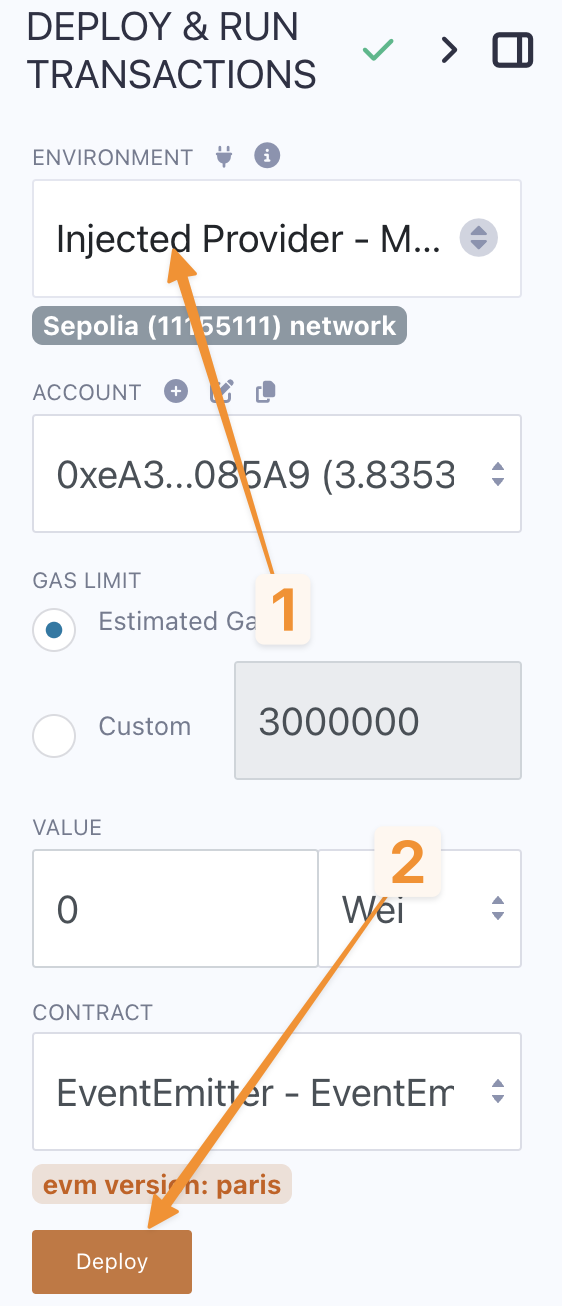 Once the contract is deployed, we can interact with it. If we click `emitCountLog` and confirm the transaction, it will emit an event `WantsToCount`. Before we continue, let’s verify our contract on Etherscan using the steps in the previous lessons. 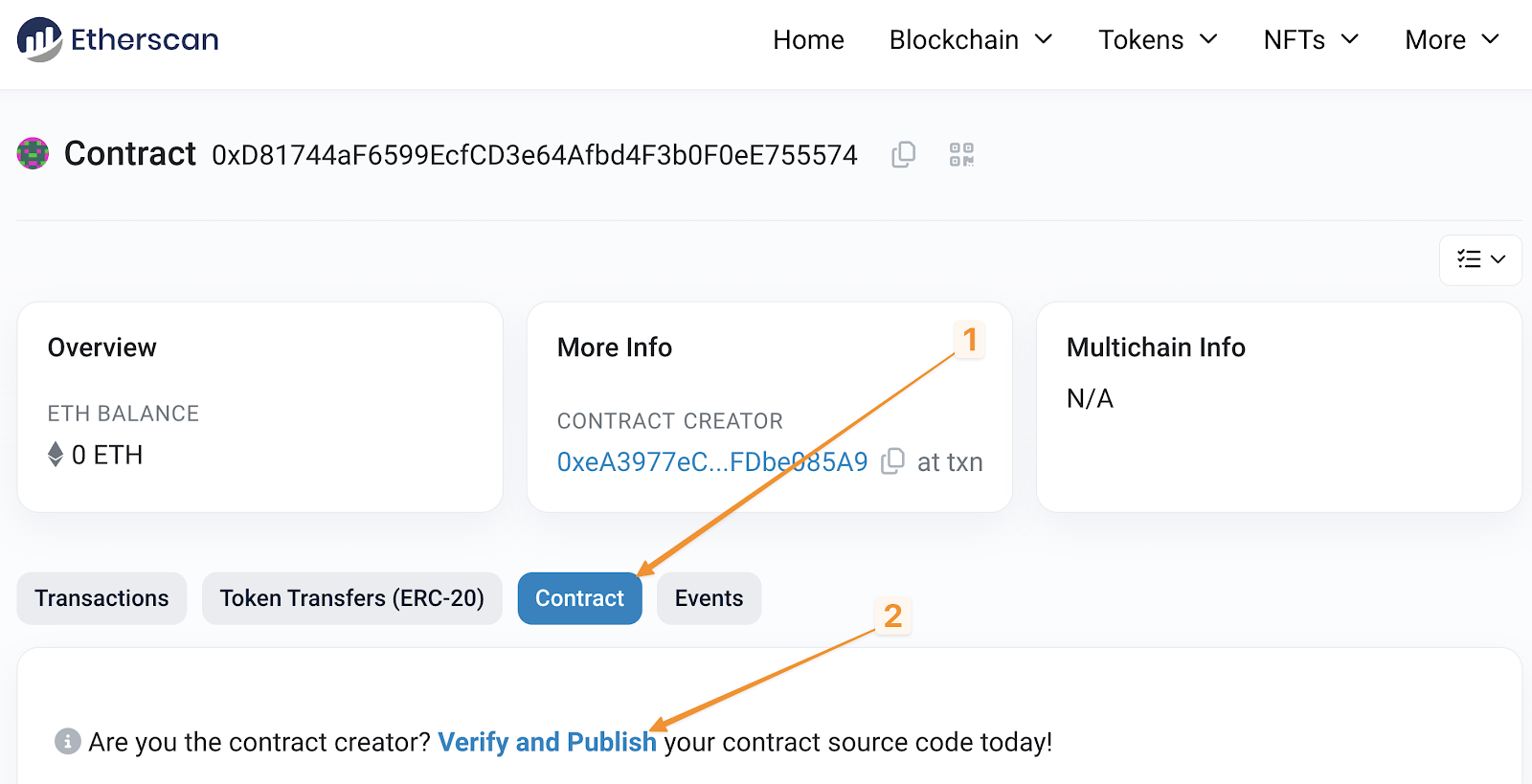 When you return to the contract on Etherscan, you should see a green checkmark next to the **Contract** tab. If we go to the **Events** tab, we should see the log from our earlier `emitCountLog` call. ## The LogTrigger contract Back in Remix, in the `log-trigger` folder, create a file called `LogTrigger.sol`. This smart contract needs to: - Inherit the `ILogAutomation` interface so it is compatible with log trigger automation. This requires we implement two functions: - `checkLog`: simulated by Automation to see if any work needs to be performed. This function returns `performData`, which is passed to the `performUpkeep` when it is executed. We will return the function caller in the `performData` so that we can emit a log containing who triggered/sent the event. - `performUpkeep`: executed by Automation when performing the upkeep. The `performData` can be used inside the function implementation. In this function, we will increment `counter` and emit a log containing who triggered the event (to demonstrate how the `performData` can be used). Copy and paste the code from the [course code repo](https://github.com/ciaranightingale/chainlink-fundamentals-code/blob/main/automation/log-trigger/LogTrigger.sol) into the `LogTrigger.sol` file. Deploy this contract to Sepolia using the steps in the previous lessons, and remember to pin the deployed contract instance to the workspace. 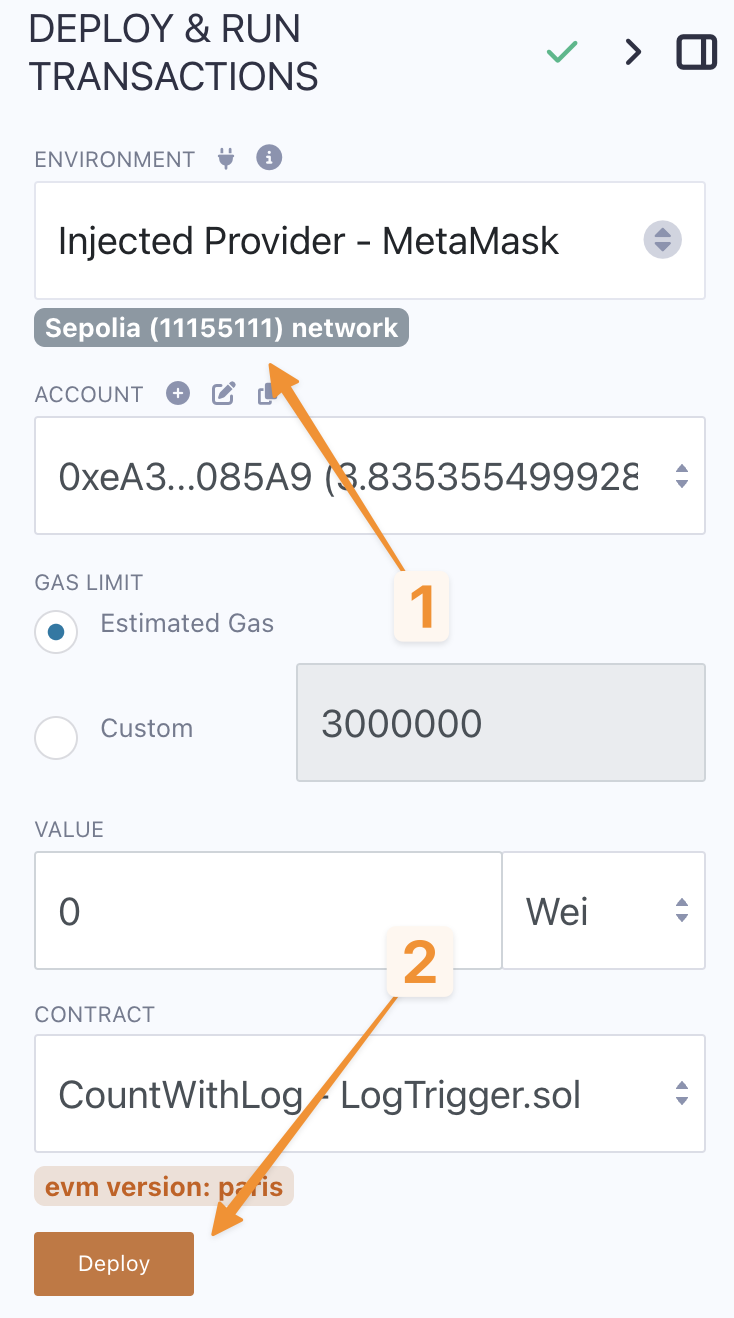 Once the contract is deployed, we can interact with it via Remix. If we check the value of the counted it will show `0`. We now need verify the contract on Etherscan. We will first need to flatten the file and use this code to do the verification. ## Creating a Log Trigger Automation Now that we’ve deployed our smart contract let’s head to the Chainlink Automation app and create the upkeep to increment our counter using Automation when our event is emitted. Select **Register new Upkeep** and select the trigger mechanism as **Log trigger**. 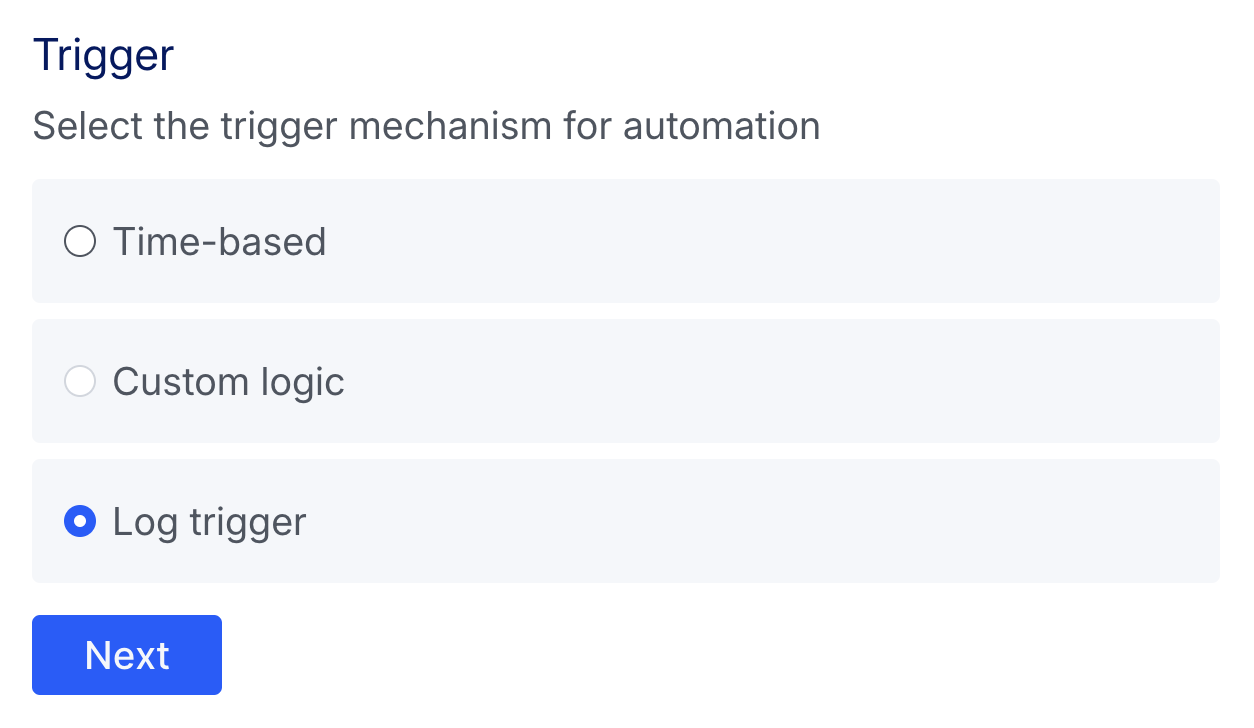 Enter the address of the `LogTrigger` contract as the **Contract to automate**. Enter the `EventEmitter` contract address for the **Contract emitting logs**, and select the `WantsToCount` event as the emitted log. Leave the **Log index topic filters** blank and click **Next** 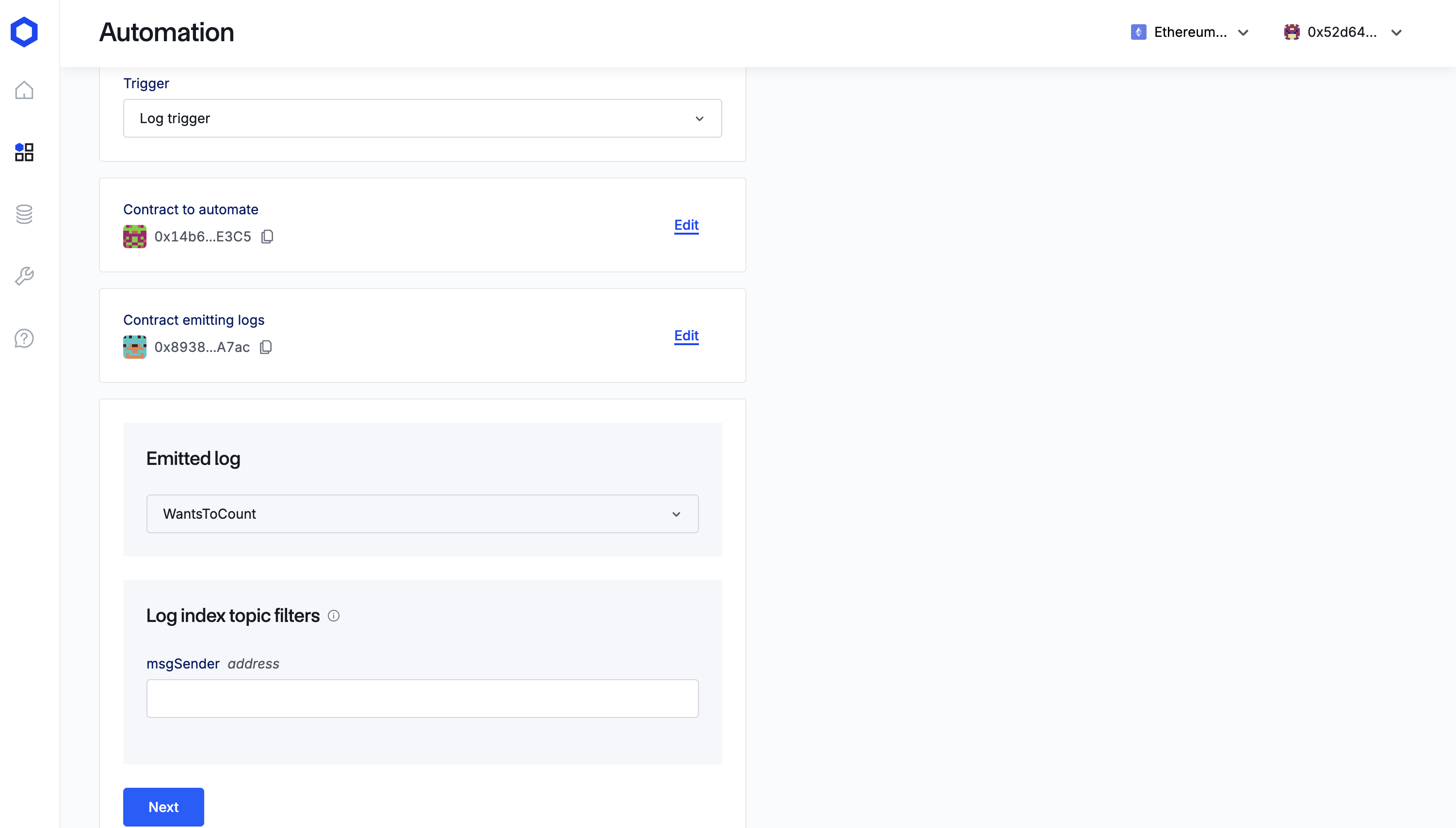 Fill in the **Upkeep details**: - **Upkeep name**: A name for the upkeep visible on the Automation dashboard, e.g. **"LogTrigger Counter"** - **Admin Address**: This will be your connected by default but you can change which address will be the admin for the upkeep here. - **Gas limit**: The maximum amount of gas your selected function for upkeep will need to perfrom. This is `500_000` by default. - **Starting balance**: A starting balance of LINK balance used to pay for Chainlink Automation. In this example, `5` LINK will surfice. - The **Project information** is optional and we are going to leave it blank. 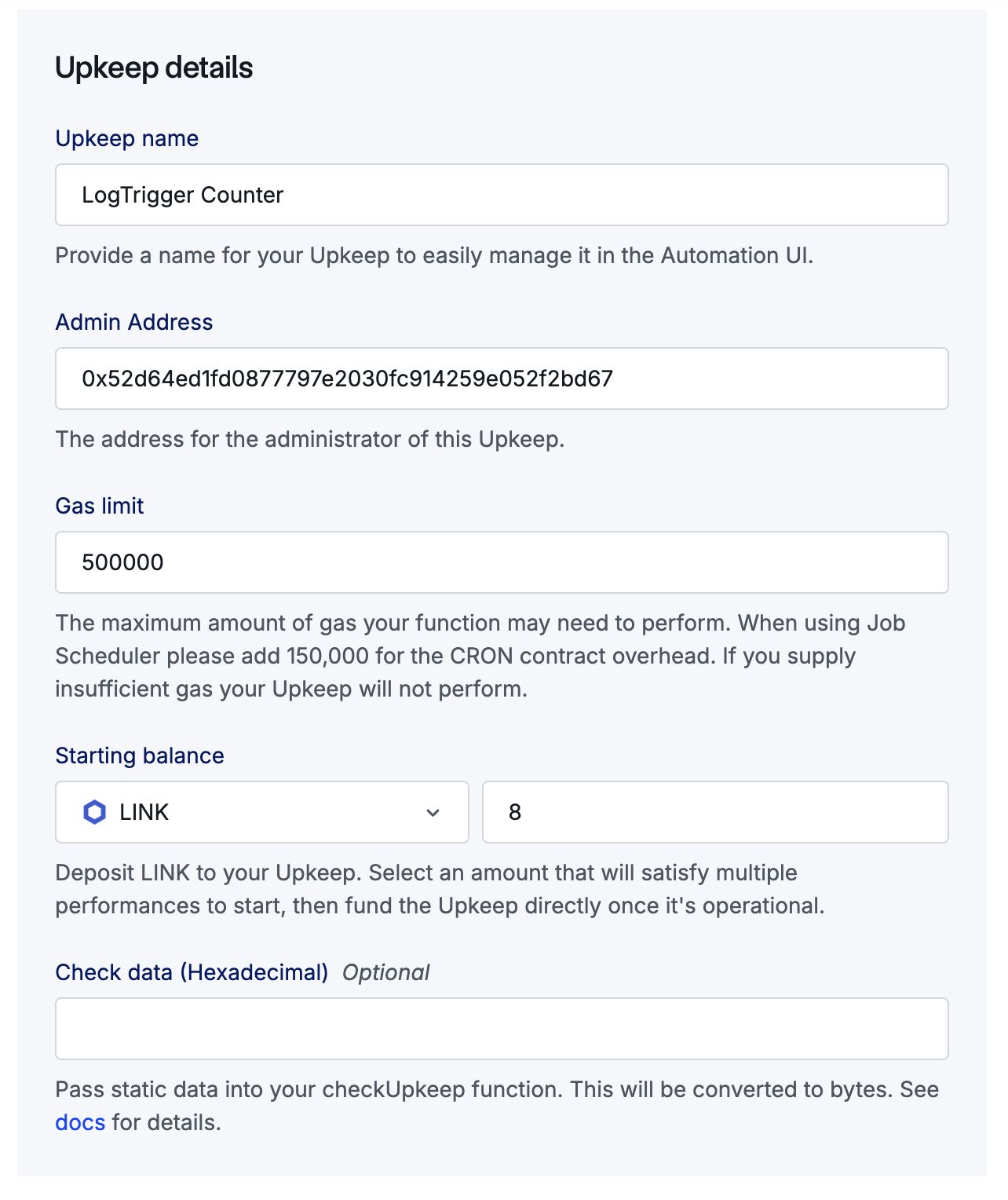 Click **Register Upkeep** and submit the registration request. Once confirmation has been received, sign the message to verify ownership. Your automation is now created! 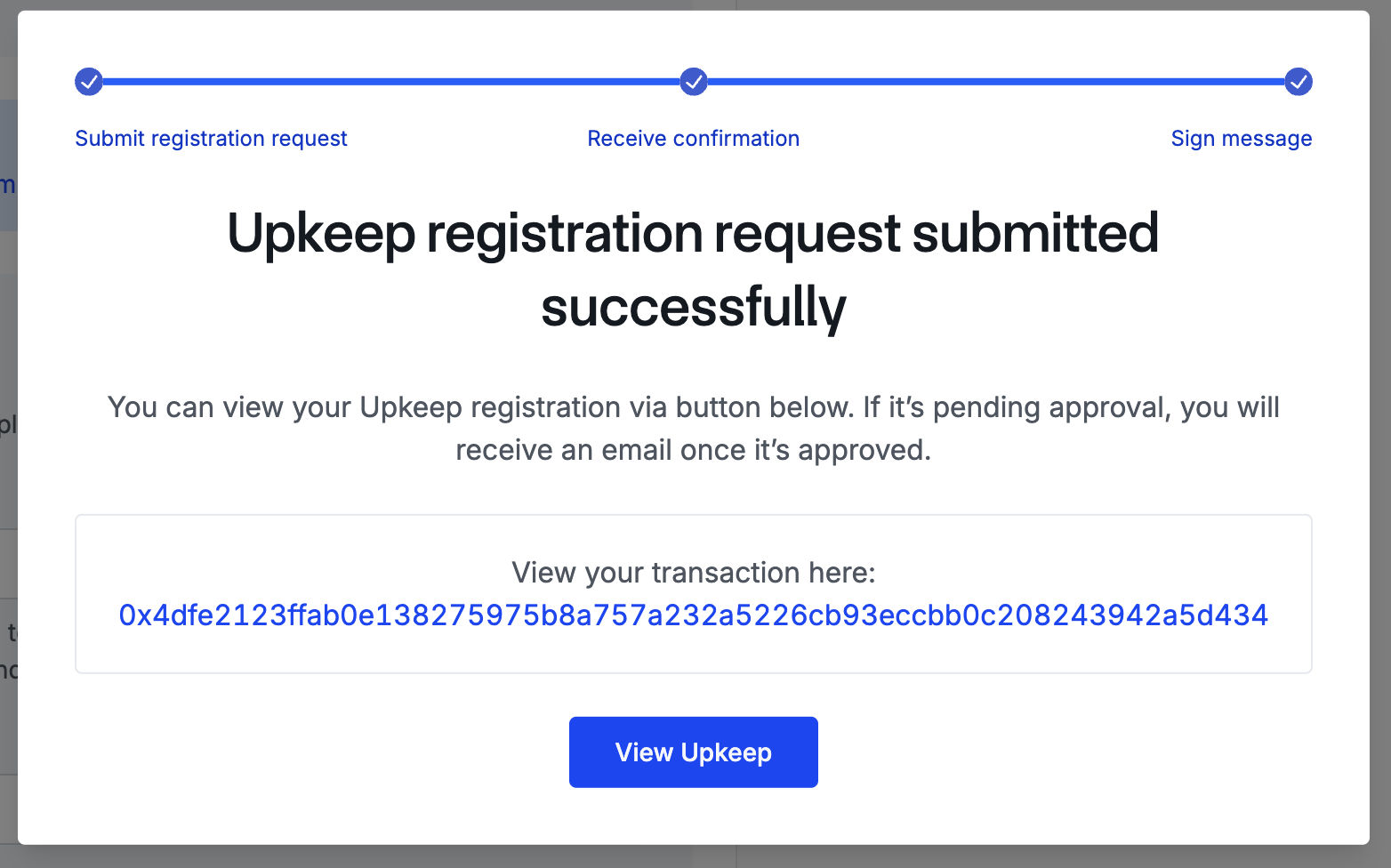 You can click **View Upkeep** to see the upkeep details as the previous two lessons. Return to Remix, head to the **Deploy & run transactions** tabs, and call the `emitCountLog` function in the `EventEmitter` contract to emit a log and trigger an upkeep. 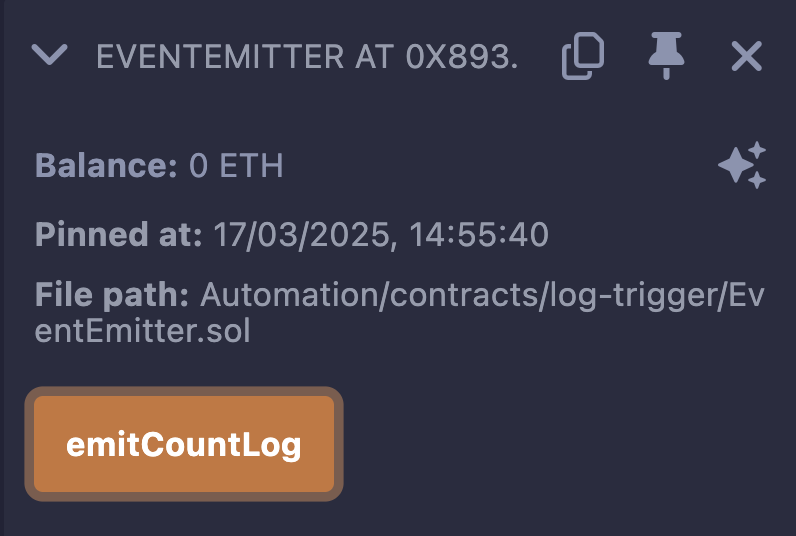 Once this transaction is complete, you should see the upkeep in the history section of your upkeep.  If you check the counted value in the `LogTrigger` contract, you’ll find that it has increased by `1`. Congratulations! You’ve automated a contract’s function execution using a log trigger Automation mechanism.
Log Trigger Automation
Log triggers in Chainlink Automation allow you to execute smart contract functions in response to on-chain events. When a contract emits a specific event (log), Chainlink Automation can detect it and automatically call a designated function in your target contract.
In this lesson, we'll build a two-contract system to demonstrate log-triggered automation:
EventEmitter Contract: This contract will emit a specific event when a certain function is called. This event will serve as the trigger for our automation.
LogTrigger Contract: This contract will contain a function that tracks how often it has been called through automation. Chainlink Automation will trigger this counter function whenever the
EventEmittercontract emits our target event.
This architecture demonstrates a powerful pattern in blockchain development - event-driven automation.
Deploying & verifying an EventEmitter contract
The EventEmitter contract
In Remix, in your "Automation" workspace in the contracts folder, create a folder named log-trigger and add a file named EventEmitter.sol.
In this file, we are going to write a simple contract that emits the event WantsToCount when the emitCountLog function is called. Copy and paste the code from the course code repo.
Deploy this contract to Sepolia using the steps in the previous lessons, and remember to pin the deployed contract instance to the workspace.

Once the contract is deployed, we can interact with it. If we click emitCountLog and confirm the transaction, it will emit an event WantsToCount.
Before we continue, let’s verify our contract on Etherscan using the steps in the previous lessons.

When you return to the contract on Etherscan, you should see a green checkmark next to the Contract tab.
If we go to the Events tab, we should see the log from our earlier emitCountLog call.
The LogTrigger contract
Back in Remix, in the log-trigger folder, create a file called LogTrigger.sol.
This smart contract needs to:
Inherit the
ILogAutomationinterface so it is compatible with log trigger automation. This requires we implement two functions:checkLog: simulated by Automation to see if any work needs to be performed. This function returnsperformData, which is passed to theperformUpkeepwhen it is executed. We will return the function caller in theperformDataso that we can emit a log containing who triggered/sent the event.performUpkeep: executed by Automation when performing the upkeep. TheperformDatacan be used inside the function implementation. In this function, we will incrementcounterand emit a log containing who triggered the event (to demonstrate how theperformDatacan be used).
Copy and paste the code from the course code repo into the LogTrigger.sol file.
Deploy this contract to Sepolia using the steps in the previous lessons, and remember to pin the deployed contract instance to the workspace.

Once the contract is deployed, we can interact with it via Remix. If we check the value of the counted it will show 0.
We now need verify the contract on Etherscan. We will first need to flatten the file and use this code to do the verification.
Creating a Log Trigger Automation
Now that we’ve deployed our smart contract let’s head to the Chainlink Automation app and create the upkeep to increment our counter using Automation when our event is emitted.
Select Register new Upkeep and select the trigger mechanism as Log trigger.

Enter the address of the LogTrigger contract as the Contract to automate.
Enter the EventEmitter contract address for the Contract emitting logs, and select the WantsToCount event as the emitted log.
Leave the Log index topic filters blank and click Next

Fill in the Upkeep details:
- Upkeep name: A name for the upkeep visible on the Automation dashboard, e.g. "LogTrigger Counter"
- Admin Address: This will be your connected by default but you can change which address will be the admin for the upkeep here.
- Gas limit: The maximum amount of gas your selected function for upkeep will need to perfrom. This is 500_000 by default.
- Starting balance: A starting balance of LINK balance used to pay for Chainlink Automation. In this example, 5 LINK will surfice.
- The Project information is optional and we are going to leave it blank.

Click Register Upkeep and submit the registration request. Once confirmation has been received, sign the message to verify ownership. Your automation is now created!

You can click View Upkeep to see the upkeep details as the previous two lessons.
Return to Remix, head to the Deploy & run transactions tabs, and call the emitCountLog function in the EventEmitter contract to emit a log and trigger an upkeep.

Once this transaction is complete, you should see the upkeep in the history section of your upkeep.

If you check the counted value in the LogTrigger contract, you’ll find that it has increased by 1.
Congratulations! You’ve automated a contract’s function execution using a log trigger Automation mechanism.
Log Trigger Automation
A practical guide to Log Trigger Automation - Understand how Chainlink Automation executes functions based on specific on-chain events (logs). Deploy `EventEmitter` and `LogTrigger` contracts and set up an upkeep triggered by emitted events.
Previous lesson
Previous
Next lesson
Next
Course Overview
About the course
What you'll learn
Smart contract and Solidity fundamentals
Chainlink’s decentralized oracle network (DON)
Chainlink Data Feeds
Chainlink Data Streams
Chainlink Automation
Chainlink CCIP
Chainlink Functions
Verifiable Random Function (VRF)
Chainlink Proof of Reserve
Course Description
Who is this course for?
- Smart Contract Developers
- Solutions Architects
- Blockchain Engineers
- Web3 Developers
- Security Researchers
Potential Careers
Smart Contract Engineer
$100,000 - $150,000 (avg. salary)
DeFi Developer
$75,000 - $200,000 (avg. salary)
Web3 developer
$60,000 - $150,000 (avg. salary)
Web3 Developer Relations
$85,000 - $125,000 (avg. salary)
Smart Contract Auditor
$100,000 - $200,000 (avg. salary)
Security researcher
$49,999 - $120,000 (avg. salary)
Blockchain Financial Analyst
$100,000 - $150,000 (avg. salary)
Last updated on July 25, 2025
Duration: 9min
Duration: 1h 17min
Duration: 42min
Duration: 30min
Duration: 1h 03min
Duration: 49min
Duration: 30min
Duration: 19min
Duration: 37min
Duration: 30min
Certification: Chainlink Fundamentals
The Chainlink Fundamentals proficiency exam covers is designed to confirm your grasp of all key concepts and learnings presented in the course material. Exam takers will have 75 minutes to complete 50 questions and must score 30/50 to pass and earn a Certificate of Completion. Because course material is continually updated, The Chainlink Fundamentals Certificate of Completions expires after 1 year. To remain current, holders must re-take the exam and pass to confirm their current knowledge.
Course Overview
About the course
What you'll learn
Smart contract and Solidity fundamentals
Chainlink’s decentralized oracle network (DON)
Chainlink Data Feeds
Chainlink Data Streams
Chainlink Automation
Chainlink CCIP
Chainlink Functions
Verifiable Random Function (VRF)
Chainlink Proof of Reserve
Course Description
Who is this course for?
- Smart Contract Developers
- Solutions Architects
- Blockchain Engineers
- Web3 Developers
- Security Researchers
Potential Careers
Smart Contract Engineer
$100,000 - $150,000 (avg. salary)
DeFi Developer
$75,000 - $200,000 (avg. salary)
Web3 developer
$60,000 - $150,000 (avg. salary)
Web3 Developer Relations
$85,000 - $125,000 (avg. salary)
Smart Contract Auditor
$100,000 - $200,000 (avg. salary)
Security researcher
$49,999 - $120,000 (avg. salary)
Blockchain Financial Analyst
$100,000 - $150,000 (avg. salary)
Last updated on July 25, 2025

